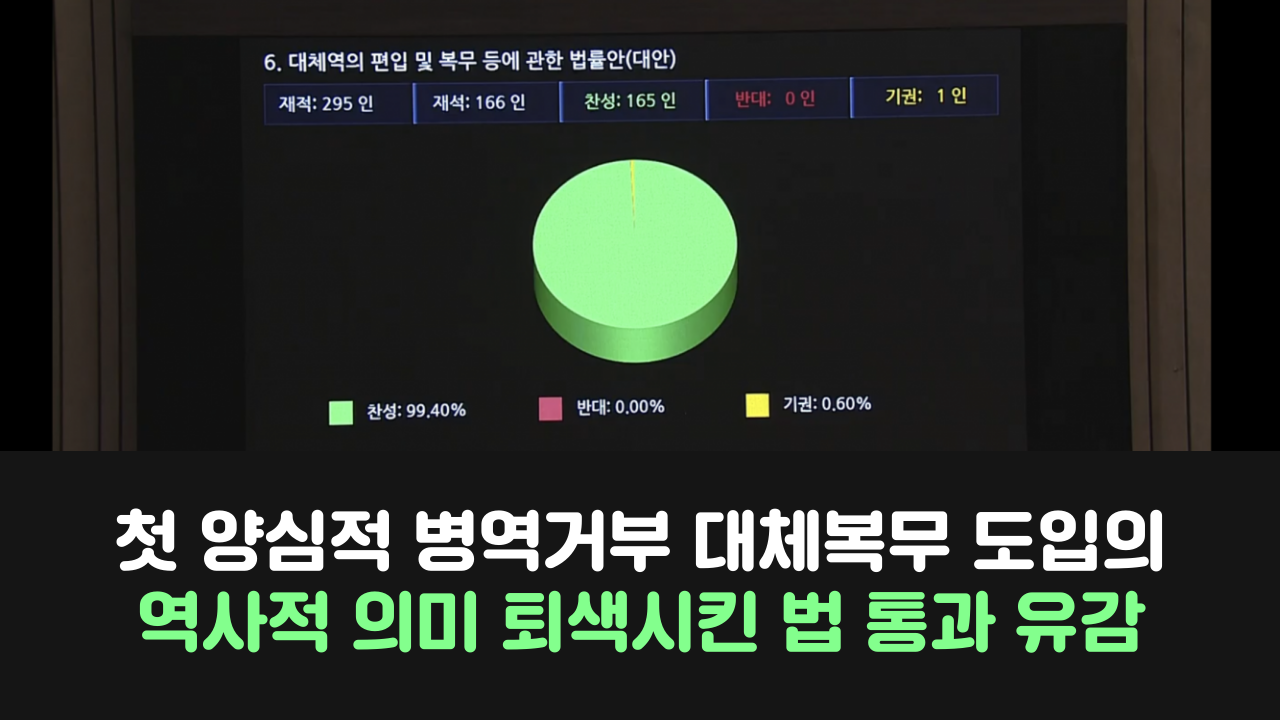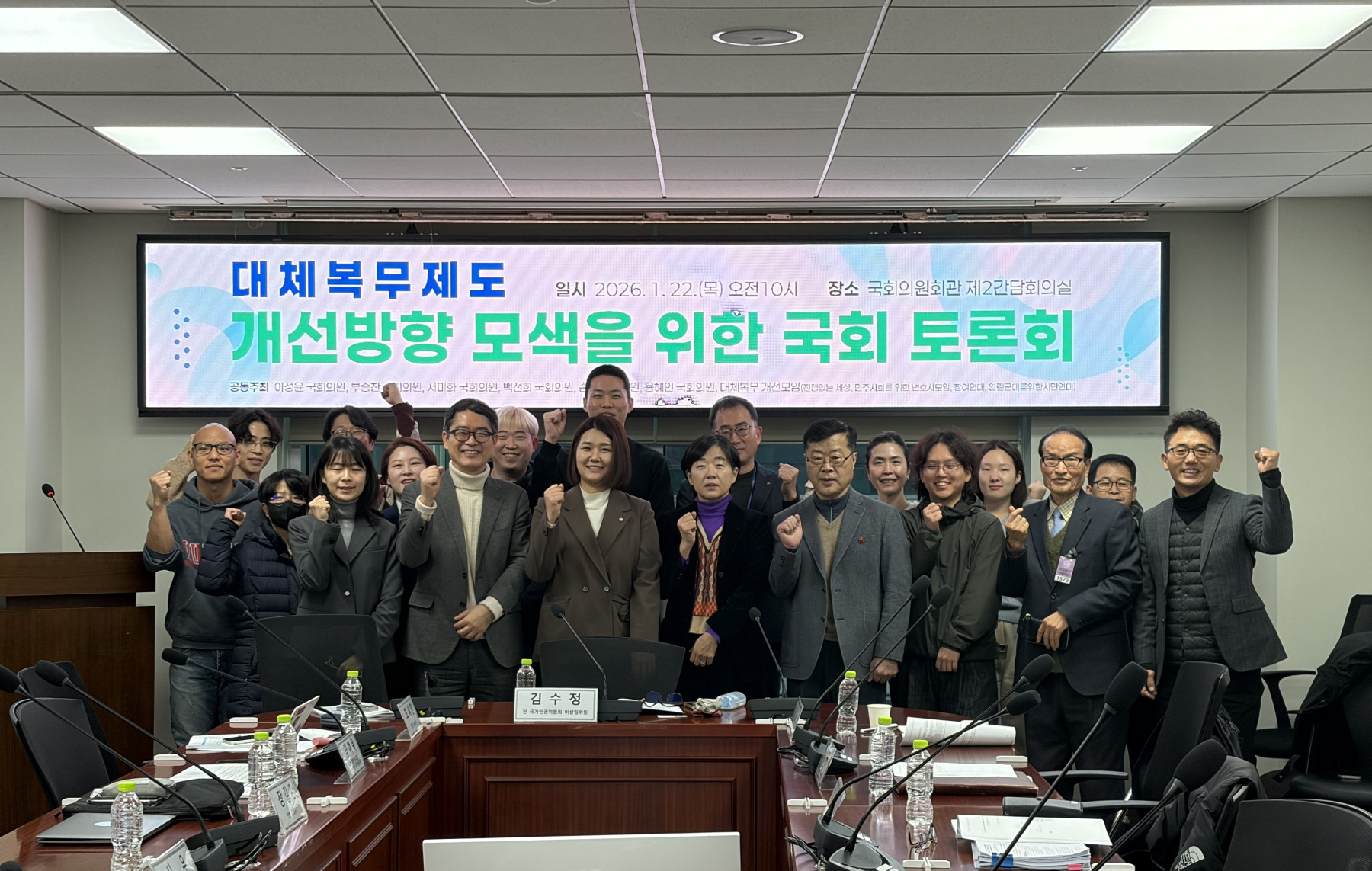오늘(12/27) 「양심적 병역거부 대체복무제 도입을 위한 대체역의 편입 및 복무 등에 관한 법률안」과 「병역법 개정안」이 국회를 통과했다. 양심적 병역거부자가 수행할 수 있는 대체복무제를 규정하지 않은 병역법이 헌법에 반한다는 헌법재판소의 결정 이후 1년 6개월 만이다. 그러나 1만 9천여 명이 넘는 양심적 병역거부자가 감옥살이를 한 후에야 어렵게 도입되는 대체복무제는 여러 문제점을 안고 있다. 병역거부자의 양심의 자유를 보호하기보다는 오히려 침해하고 있으며, 제도 시행의 편의를 위해 인권과 평화의 가치를 제대로 반영하지 않고 있기 때문이다. 오랜 시간 양심적 병역거부에 대한 대체복무제 도입을 요구해 왔던 우리 시민사회단체들은 그 역사적 의미를 퇴색시키는 법을 통과시킨 국회를 강력히 규탄한다.
이번 법 개정으로 현역병 복무 기간의 두 배에 달하는 36개월을 교정시설에서만 합숙 근무하도록 하는 징벌적 성격의 대체 복무가 시행될 예정이다. 이는 헌법재판소가 결정문을 통해 “대체복무 기간이나 고역의 정도가 과하여 양심적 병역거부자라 하더라도 이를 선택하기 어렵게 만드는 것은 대체복무제를 유명무실하게 하거나 징벌로 기능하게 할 수 (중략) 있다”고 명시한 것에 반하는 것이다. 또한 개정된 법은 대체복무 심사위원회를 병무청 산하에 두고 위원장 제청권을 국방부 장관에게 주고 있어 “대체복무 심사의 공정성, 객관성, 투명성을 유지하기 위해, 심사기구를 국방부·병무청과 분리하여 설치”(2019년, 「대체역의 편입 및 복무 등에 관한 법률안」에 대한 의견표명)하라는 국가인권위의 권고도 묵살했다.
국회에서 통과된 개정안은 정부안의 문제점을 전혀 개선하지 못했을뿐더러 어떤 면에서는 정부안보다 후퇴했다. 법안의 문제점을 살펴보면, 현역 군인의 병역거부를 인정하지 않음으로써 양심의 자유를 제한하고 있고, 사전 고지 의무 조항을 삭제하여 국민의 권리임을 알려야 할 국가의 책임을 방기하고 있다. 심사위원의 구성 비율을 조정하고 심사위원장을 국방부 장관이 제청할 수 있도록 한 것 등은 심사위원회의 독립성을 침해하는 것으로 정부안보다 후퇴한 것이다. 여성심사위원의 비율 조항을 삭제한 것 또한 시대적 흐름에 역행한다.
또한 한국 정부에 수차례에 걸쳐 대체복무 도입을 촉구해온 유엔 등 국제기구의 기준에도 맞지 않는다. 데이비드 케이(David Kaye) 유엔 의사·표현의 자유 특별보고관과 아흐메드 샤히드(Ahmed Shaheed) 유엔 종교·신념의 자유 특별보고관은 지난 11월 28일 한국 정부에 서한(영문 / 한글)을 보내 한국이 도입하려는 대체복무 법안의 여러 문제점을 지적하고 우려를 표한 바 있다.
우리나라에서 양심적 병역거부자의 대체복무제 첫 도입이라는 역사적 의미는 이러한 여러 문제점으로 인해 크게 퇴색되었다. 뿐만 아니라 시작부터 유명무실한 제도로 전락하거나, 병역거부자들이 제대로 자신의 권리를 행사하지 못할 가능성이 높다. 국방부와 병무청으로부터 충분히 독립적이지 못한 심사위원회에서 병역거부는 권리의 대상이 아니라 처벌의 대상일 수 있기 때문이다. 유엔 인권이사회 등 국제사회의 권고가 계속될 것 또한 불 보듯 뻔하다.
그동안 병역거부권 보장과 대체복무제 도입을 위해 활동해 온 우리는 다시 문제투성이 대체복무법을 개정하기 위한 활동을 펼칠 것이다. 정부와 국회는 대체복무제가 시행되기 전에 예상되는 문제를 방지하기 위한 법 개정에 즉각 나서야 한다. 조속한 법 개정을 통해 그동안 국내⋅외 인권⋅평화 시민사회단체, 유엔 등 국제기구, 국가인권위와 헌법재판소 등 국내 기구들에서 제시한 원칙이 제대로 구현되도록 해야 한다. 끝.
2019년 12월 27일 군인권센터, 민주사회를위한변호사모임, 전쟁없는세상, 참여연대
Shame on the enaction of the bill that degrades the significance of the first alternative military service for conscientious objectors
Today (Dec 27), two bills to introduce alternative service for conscientious military objectors, 「Legislative Bill on Incorporation and Service of Alternative Military」 and 「Amendment to Military Service Act」, passed the National Assembly. This happened in a year and a half since the Constitutional Court decision that stated the current Military Service Act unconstitutional for reasons that it lacks regulations about substitutable services for conscientious military objectors. Unfortunately, the alternative option that is at last being adopted over nineteen-thousand imprisonments, is precarious. This bill is violating than to protect the freedom of conscience. Moreover, rather than to reflect the value of human rights and peace, it prioritizes executive convenience. Thereby, the civic groups including us who have long fought against the government to provide alternative service options, strongly rebuke the National Assembly for passing a bill that fades its significance.
According to the bill, the penalty-like characteristics of alternative service will make the ones who reject to spend thirty-six months in correctional institutions’ dormitories. This goes against the Constitutional Court’s decision that “If excessive and made difficult to choose this option, it may be a useless option or a punishment”. Furthermore, the bill disregards The National Human Rights Commission’s suggestion by placing the examination commission under Military Manpower Administration and the right of nomination to the Minister of National Defense, all “to guarantee fairness, objectiveness, and transparency, the judging institution shall be installed separately from the Ministry of National Defense and Military Manpower Administration” (2019, Expression of opinion about the Legislative Bill on Incorporation and Service of Alternative Military).
The bill did not alleviate the problems in the government proposal, and in some parts even backtracked from the original. It first limits the freedom of conscience by not acknowledging soldiers in active duty and abandons the government’s responsibility to inform its people of their rights by deleting the obligation for advance notice. Furthermore, through adjusting the members component ratio and allowing the Minister of National Defense to nominate the chairperson, violates the autonomy of the commission, which is a clear regression. It also goes against the periodic tide to eliminate the part that codified ratio of female members.
Moreover, this falls short of the international organizations’ standards, which have constantly pressed the Korean government for an adoption of alternative services. David Kay, the UN Special Rapporteur on Right to Freedom of Opinion and Ahmen Shaheed, the UN Special Rapporteur on freedom of religion or belief, sent a letter last November 28th to express concerns and to point out issues of the alternative service bill Korea will soon adopt.
The problems elaborated in previous paragraphs regressed the historic importance of being the very first adoption of alternative military service for conscience objectors. There seems to be a high chance of this to either be a titular policy from its onset or keep the objectors from exercising their rights. In the examination process that the commission that is not fully independent from the Ministry of National Defense and the Military Manpower Administration conducts, rejecting military service can be regarded more as a subject of punishment than freedom. It is also for certain that the international community, like the Human Rights Committee of UN, will continue to press the Korean government.
We who have actively raised voices for the adoption of alternative service and guarantee of right to reject military service, will continue to call for amendments to this problematic Alternative Military Service Act. The government and the National Assembly should immediately revise the law to prevent seeming problems before the policy is enforced. For a rapid modification, the principles which domestic and international human rights and peace civic groups, international organizations like UN, domestic institutions like National Human Rights Commission and the Constitutional Court have proposed, should be taken into consideration.
translated by Hyewon Yoon
December 27th, 2019
This comment endorsed by:
Center for Military Human Rights Korea
MINBYUN, Lawyers for a Democratic Society
World Without War
People’s Solidarity for Participatory Democracy (PSPD)








![[성명] 미얀마 군부 쿠데타 5년: 징병제 부활로 심화되는 인권 위기](https://withoutwar.org/www_wp/wp-content/uploads/2026/01/myanmar-45x45.png)
![[국제공동성명] 병역거부자이자 인권활동가, 유리 셸리아젠코 탄압에 대한 긴급 성명](https://withoutwar.org/www_wp/wp-content/uploads/2026/01/123123-45x45.jpg)
![[보도자료] 대체복무제도 개선방향 모색을 위한 국회 토론회](https://withoutwar.org/www_wp/wp-content/uploads/2026/01/IMG_8696-45x45.jpg)
![[성명] 병역거부자를 가두는 나라에 양심의 자유는 존재하지 않는다 – 병역거부자 나단의 항소심 유죄 선고에 부쳐](https://withoutwar.org/www_wp/wp-content/uploads/2026/01/nadan-45x45.jpg)
![[평화를 살다] “요리하고 먹고 저항하라” – 팔라펠과 후무스](https://withoutwar.org/www_wp/wp-content/uploads/2026/02/5-45x45.jpg)
![[평화를 읽다] 역사를 품은 그림, 쓸쓸함을 알아차리는 다정함 – 『어느 쓸쓸한 그림 이야기』를 읽고](https://withoutwar.org/www_wp/wp-content/uploads/2026/02/book-45x45.jpg)

